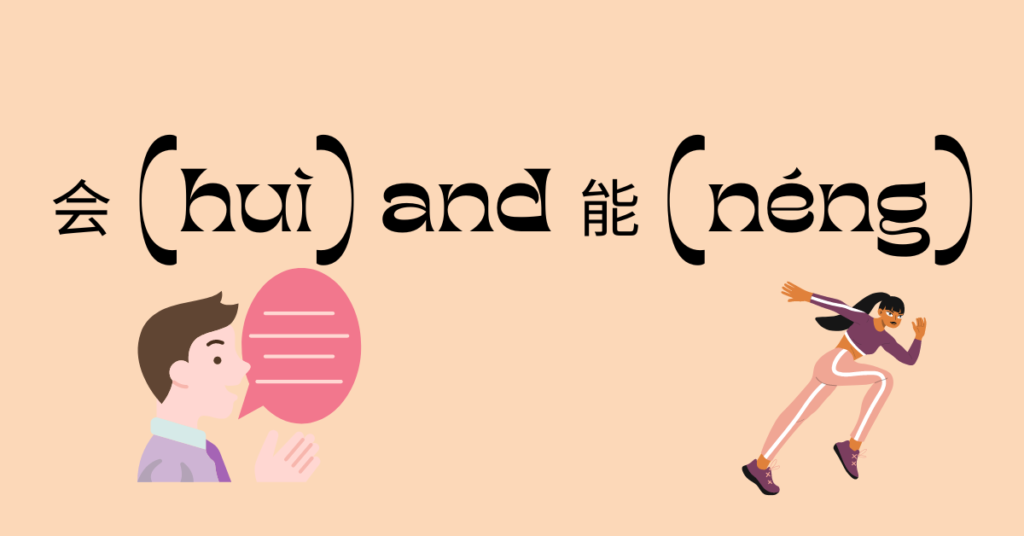
Here’s a detailed explanation of the common Chinese grammar patterns for 会 (huì) and 能 (néng), along with examples:
1. 会 + Verb:
Structure: This pattern is used to indicate the ability or skill to do something in the future. It is followed by a verb to express the capability of performing that action.
- Example: 我会说中文 (wǒ huì shuō Zhōngwén) – “I can speak Chinese.”
- In this pattern, 会 (huì) denotes the ability or skill to carry out the action specified by the verb. It suggests that the speaker possesses the knowledge or capability to do something.
2. 能 + Verb:
Structure: This pattern is used to express the ability or possibility to do something. It is followed by a verb to indicate the capability or feasibility of performing that action.
- Example: 他能跑得很快 (tā néng pǎo de hěn kuài) – “He can run very fast.”
- Here, 能 (néng) indicates the ability or possibility of carrying out the action specified by the verb. It suggests that the subject has the physical or mental capacity to do something.
Both 会 (huì) and 能 (néng) are used to express capability, but they differ in usage:
- 会 (huì) implies the skill or knowledge acquired through learning or experience. It is commonly used for abilities related to languages, skills, or expertise.
- Example: 我会弹钢琴 (wǒ huì tán gāngqín) – “I can play the piano.”
- 能 (néng) emphasizes the innate capacity or physical ability to do something. It is used for general abilities or possibilities.
- Example: 他能游泳 (tā néng yóuyǒng) – “He can swim.”
These grammar patterns with 会 and 能 allow you to express the capability or possibility of performing actions in Chinese. Understanding the subtle differences between them will help you convey the right meaning and nuance in various contexts.
Dialogue
Person A: 你会弹钢琴吗?
(Do you know how to play the piano?)
(Nǐ huì dàn gāngqín ma?)
Person B: 会!我学了好多年了。
(Yes, I do! I have been learning for many years.)
(Huì! Wǒ xuéle hǎoduō niánle.)
Person A: 真厉害!我也想学,你能教我吗?
(That’s impressive! I also want to learn. Can you teach me?)
(Zhēn lìhài! Wǒ yě xiǎng xué, nǐ néng jiào wǒ ma?)
Person B: 当然可以!我可以教你基础的技巧。
(Of course! I can teach you the basic techniques.)
(Dāngrán kěyǐ! Wǒ kěyǐ jiào nǐ jīchǔ de jìqiǎo.)
Person A: 太好了!谢谢你的帮助。
(That’s great! Thank you for your help.)
(Tài hǎole! Xièxiè nǐ de bāngzhù.)
Person B: 不客气,我很愿意帮助你。
(You’re welcome. I’m happy to help.)
(Bù kèqì, wǒ hěn yuànyì bāngzhù nǐ.)
In this dialogue, the verbs “会” (huì) and “能” (néng) are used to indicate the ability or knowledge to do something. Person A asks if Person B knows how to play the piano, and Person B confirms their ability by saying “会.” Person A expresses their desire to learn and asks if Person B can teach them, using “能” to inquire about their capability. Person B agrees to teach and expresses their willingness to help. The use of “会” and “能” demonstrates the ability to perform a certain action, and it sets the context for the conversation about piano lessons.
Exercise
- Create your own sentences using 会 (huì) and 能 (néng)